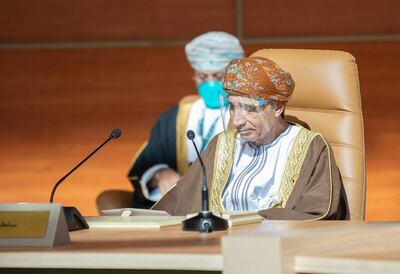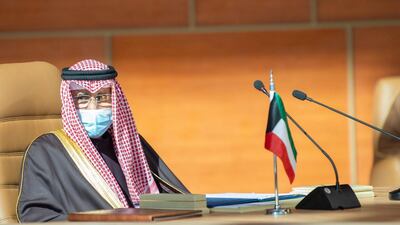The Gulf Co-operation Council summit was marked by the presence of a new guard in the two countries that have played important roles for reconciliation in the six-member group.
Sultan Qaboos of Oman and Sheikh Sabah of Kuwait, elder statesmen and pillars of Gulf diplomacy, died nine months apart last year.
But Tuesday's high-level gathering was named after them in a tribute announced by Saudi Crown Prince Mohammed bin Salman during the opening address he delivered on behalf of his father, King Salman.
Kuwait’s Emir, Sheikh Nawaf, succeeded the country’s late statesman, Sheikh Sabah, in September.
As defence minister and a major figure in the security forces, he supported the high-profile diplomacy of Sheikh Sabah, who played a major role in resolving conflicts in the region and abroad.
Kuwait’s leading diplomatic role was highlighted by the appointment of Abdullah Bishara as the first GCC secretary general in 1981.
The veteran Kuwaiti diplomat held the position until 1993.
The country’s Foreign Minister, Ahmed Al Sabah, also attended Tuesday’s summit.
Educated in France, he first held the position in 2006 and has been the public face of the country’s diplomacy, centred on resolving problems.
Sheikh Ahmed announced on Monday that an agreement had been reached to open the airspace and borders between Saudi Arabia and Qatar.
The deal breaks the ice in relations between the two countries marked by tension since Saudi Arabia, Bahrain, the UAE and Egypt boycotted Qatar in June 2017 over its support of extremist groups.
After a call among Sheikh Nawaf, Qatari Emir Sheikh Tamim and Prince Mohammed, Qatar announced that Sheikh Tamim would attend the GCC summit for the first time. The 41st summit is being held in Al Ula in Saudi Arabia.
Sheikh Nawaf said he hoped the summit of "reconciliation" would be good for the GCC countries to address "all related issues and return matters to normal".
But the ground for Kuwait’s diplomatic success was laid by Sheikh Sabah, who played a main role in containing a 2014 GCC row after Saudi Arabia, the UAE and Bahrain withdrew their ambassadors from Qatar.
He sought to repeat the feat by making several initiatives to heal the schism that broke out in mid-2017.
Kuwait’s new ruler is maintaining a GCC-focused foreign policy while building ties with Iran.
A similar approach has marked the foreign policy of Oman, where Sultan Haitham succeeded Sultan Qaboos in January 2020.

Sultan Qaboos ruled Oman for nearly half a century and, although Oman’s diplomacy has not been as high-profile as Kuwait, it has been similar in focusing on building GCC unity while maintaining open channels with Iran.
Together with Sheikh Sabah, the late sultan represented an older generation of Gulf leaders who valued balance in their foreign policy.
Oman’s Foreign Minister is the British-educated Badr Al Busaidi, whose late father was a long-time personal adviser to Sultan Qaboos.
He replaced Yusuf bin Alawi in August, having served under him as the Foreign Ministry’s secretary general.
At the Manama dialogue in December, Mr Al Busaidi stressed that inclusiveness and multilateral approach were central to regional security.
Omani Deputy Prime Minister Sayyid Fahd bin Mahmoud Al Said is leading the sultanate's delegation to the summit.
Sheikh Mohammed bin Rashid, Vice President and Ruler of Dubai, led the UAE's delegation to the summit.
Sheikh Mohammed said on Tuesday that "the spirit of co-operation is renewed for the benefit of our peoples".
"In 1981, 40 years ago today, our Father and Founder of our country, Sheikh Zayed, hosted the first summit in Abu Dhabi with his brothers, the leaders of the GCC countries," he said.
"The process of co-operation is the legacy of these leaders for their people. Today, the march is strengthened."





















